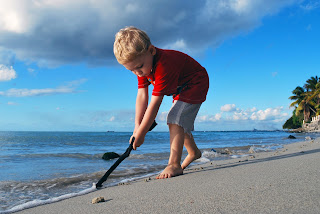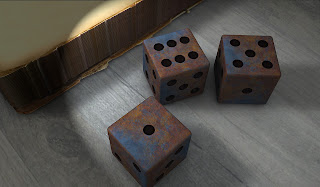
Wild West Sayings We Use Today, Part 31
No Great Shakes
This idiom, which means ‘nothing to brag about,’ has been around since the early 1800s, and possibly before. Several theories exist on the origin of 'no great shakes.' Some believe it derived from gambling with dice. Others suspect the phrase evolved from an obsolete sense of ‘shake,’ which once signified ‘swagger.’Historical Reference: The first known print citation came from Sir John Cam Hobhouse, the first Baron Broughton, a politician and friend to Lord Byron. In Recollections of a Long Life, his 6-volume memoir, Lord Broughton referred to an art show held in 1816: “W. said that a piece of sculpture there was 'nullae magnae quassationes,' and the others laughed heartily.” (Note: The others were proficient linguists, who understood the Latin for ‘no great shakes’ at once.
Example: I’ve tasted her meatloaf. She’s no great shakes at cooking.
Shake a Leg

The use of ‘shake a leg’ for ‘hurry up and get started’ appears to have come from an old nautical saying with a colorful backstory.
Historical Reference: In the 1700s through the 1800s, many men were kidnapped and forced into service on sailing vessels. To keep them from deserting, sailors were restricted from going ashore in port. However, the wives of married sailors could join their husbands onboard. In the bunk area in the mornings, the petty officer would shout, ‘show a leg,’ or ‘show a leg and put a stocking on it.’ Feminine ones could remain under the covers. Hairy legs betrayed their owners, who had to get up and work.
Example: Shake a leg, will you? We don’t have all day.
More Than You Can Shake a Stick At

This delightfully picturesque expression for ‘too many to count’ inspires interesting mental pictures. Shaking a stick can be considered threatening, so some people suggest this phrase came from warfare. Others picture children at play. No one knows the exact origin. I vote for children at play.
Historical Reference: The first print citation for this phrase appeared in “The Lancaster Journal” (Pennsylvania; 1818): "We have in Lancaster as many Taverns as you can shake a stick at."
Example: My mother has more yarn than you can shake a stick at.
Thanks for traveling into another installment of Wild West Sayings We Use Today. Don't rush off. I'd love to know your thoughts.
- Were you aware of these phrases and meanings or did they surprise you?
What's New with Janalyn Voigt
The deadline for The Whispering Wind (Montana Gold, book 6) was the worst I’ve ever faced. To make a long story short, I hurt my back last fall by lifting a heavy canner. My injury had nearly healed when I decided it would be a good idea to carry a 50-lb. bag of sugar. (What could go wrong?) This reactivated the earlier injury. To alleviate the pain, I applied a muscle rub. This gave me a chemical burn, complete with nerve damage. Constant pain, sleep disruptions, and the inability to type without muscle spasms made meeting my deadline seem impossible at times.
Thankfully, my publisher was gracious. I could use dictation to type and voice-edit. And my dear husband stepped in to help with the dishes. He even cooked dinner one night. It turned out well, which is saying something. My husband’s informal nickname around here is ‘Mr. Burny Man.’ If you’ve read Hills of Nevermore (Montana Gold, book 1), Nate is modeled after my husband. Enough said.
I’m grateful to report that I turned in The Whispering Wind on Thursday. The story never stopped coming, which boosted my faith to continue working. The plot involves two people, ironically enough, in pain. I could relate, although my characters suffered emotional pain, whereas mine was quite physical. I’ve sustained no permanent damage, and the book is finished. God is good.
Learn more about Janalyn Voigt and her books.
Hills of Nevermore
Can a young widow hide her secret shame from the Irish preacher bent on helping her survive?
In an Idaho Territory boom town, America Liberty Reed overhears circuit preacher Shane Hayes try to persuade a hotel owner to close his saloon on Sunday. Shane lands face-down in the mud for his trouble, and there’s talk of shooting him. America intervenes and finds herself in an unexpectedly personal conversation with the blue-eyed preacher. Certain she has angered God in the past, she shies away from Shane.
Addie Martin, another widow, invites America to help in her cook tent in Virginia City, the new mining town. Even with Addie’s teenage son helping with America’s baby, life is hard. Shane urges America to depart for a more civilized location. Neither Shane’s persuasions nor road agents, murder, sickness, or vigilante violence can sway America. Loyalty and ambition hold her fast until dire circumstances force her to confront everything she believes about herself, Shane, and God. Available in print, digital, and audiobook formats. Purchase Hills of Nevermore.
Based on actual historical events during a time of unrest in America, Hills of Nevermore explores faith, love, and courage in the wild west.
In an Idaho Territory boom town, America Liberty Reed overhears circuit preacher Shane Hayes try to persuade a hotel owner to close his saloon on Sunday. Shane lands face-down in the mud for his trouble, and there’s talk of shooting him. America intervenes and finds herself in an unexpectedly personal conversation with the blue-eyed preacher. Certain she has angered God in the past, she shies away from Shane.
Addie Martin, another widow, invites America to help in her cook tent in Virginia City, the new mining town. Even with Addie’s teenage son helping with America’s baby, life is hard. Shane urges America to depart for a more civilized location. Neither Shane’s persuasions nor road agents, murder, sickness, or vigilante violence can sway America. Loyalty and ambition hold her fast until dire circumstances force her to confront everything she believes about herself, Shane, and God. Available in print, digital, and audiobook formats. Purchase Hills of Nevermore.
Based on actual historical events during a time of unrest in America, Hills of Nevermore explores faith, love, and courage in the wild west.





Thanks for posting today! Sorry to hear of your ordeal, maybe you could take it easy on your poor back? (lol) I was really surprised at "shake a leg", never would have thought of that in a million years. And "shake a stick at", I've said it but never really considered how it came to be, as with many of the sayings I use, and that's why I love your blog series!
ReplyDeleteHello, Connie! It's good to be back to posting. I love this series, too. The probable origin of 'shake a leg' cracked me up. It also inspired me to think of writing an adventure story involving a sailor pressed into service. :) I get a lot of ideas, but this one might find its way to print. Thanks for commenting. See you next month!
ReplyDeleteI Janalyn, I've never heard the first one, but the others I've heard my folks say a lot. I enjoy this series of WW Sayings! Hope you get to feeling better...
ReplyDeleteHello, Karen. It's funny to learn there are people who have never heard of what I thought was a common slang expression. That happens between my editor and me all the time. I think it happens when phrases are specific to certain regions or countries. Thanks for the well wishes.
ReplyDeleteHi Janalyn, I've heard of these saying, however, didn't know how they came to be. Thanks for a wonderful post!
ReplyDeleteYou're welcome, Michelle. I'm glad you enjoyed learning about the history of words with me. :)
ReplyDelete